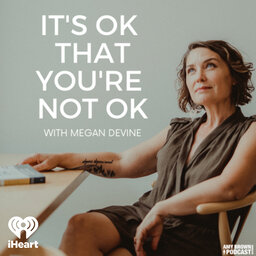Overachieving As a Cry For Help: with Laurel Braitman
Lots of smart, high achieving people learned to greet pain with stoicism: by being mature and responsible, even as kids.
But what happens when you can’t maintain the facade of having your sh*t entirely together? Do you ever get to be less than Super Human?
In this episode we cover:
- Perfectionism as a coping mechanism for all kinds of emotional wounds
- Is distraction bad for you?
- When the worst has already happened, how do you control your anxiety?
- Is there any good way to tell kids that someone they love is dying?
- Working within systems where vulnerability is punished (looking at you, medicine & law)
- How medical aid in dying has changed over the years
Looking for a creative exploration of grief? Check out the best selling Writing Your Grief course here.
“I live with a constant fear of liking anyone or anything too much lest I lose it.” - Laurel Braitman
Related episodes:
Connection Is the Best Medicine: with Dr. Rana Awdish
Elise Loehnen: The 7 Deadly Sins and the Crown of Sadness
Follow our show on Instagram, Facebook, Twitter, and TikTok @refugeingrief and @itsokpod on TikTok. Visit refugeingrief.com for resources & courses
About our guest:
Laurel Braitman is a New York Times bestselling author - her new book, What Looks Like Bravery: An Epic Journey Through Loss to Love, is out now. She’s the founder of Writing Medicine, a global community of writing healthcare professionals, and the Director of Writing and Storytelling at the Medical Humanities and the Arts Program at the Stanford University School of Medicine. Find her at laurelbraitman.com and on IG @laurel_braitman.
About Megan:
Psychotherapist Megan Devine is one of today’s leading experts on grief, from life-altering losses to the everyday grief that we don’t call grief. Get the best-selling book on grief in over a decade, It’s Ok that You’re Not OK, wherever you get books. Find Megan @refugeingrief
Additional resources:
Writing Medicine - Laurel Braitman’s global writing community for healthcare workers
Want to talk with Megan directly? Join our patreon community for live monthly Q&A grief clinics: your questions, answered. Want to speak to her privately? Apply for a 1:1 grief consultation here.
Books and resources may contain affiliate links.
 It’s OK That You’re Not OK with Megan Devine
It’s OK That You’re Not OK with Megan Devine


